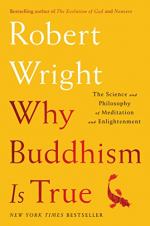|
This section contains 1,006 words (approx. 3 pages at 400 words per page) |

|
Summary
A prominent Thai monk, Ajahn Chah, once famously said that the concept of the not-self could be understood only through experience (i.e. meditation) and not through intellect (i.e. deliberate thought). In fact, another Buddhist monk argues that the illusory concept of the self is the source of all evil— “selfish desire, craving, attachment, hatred, ill-will, conceit, pride, egoism, and other defilements, impurities, and problems” (59).
To enlighten five monks, Buddha first implies that the two defining qualities of the self are the state of being under control and being permanent. He then separates the concept of a human into five aggregate parts— one’s form, one’s feelings, one’s perceptions, one’s mental formations, and one’s consciousness. Consciousness, here, simply refers to one’s awareness of the existence of the other four parts. He runs through...
(read more from the The Alleged Nonexistence of Your Self Summary)
|
This section contains 1,006 words (approx. 3 pages at 400 words per page) |

|




